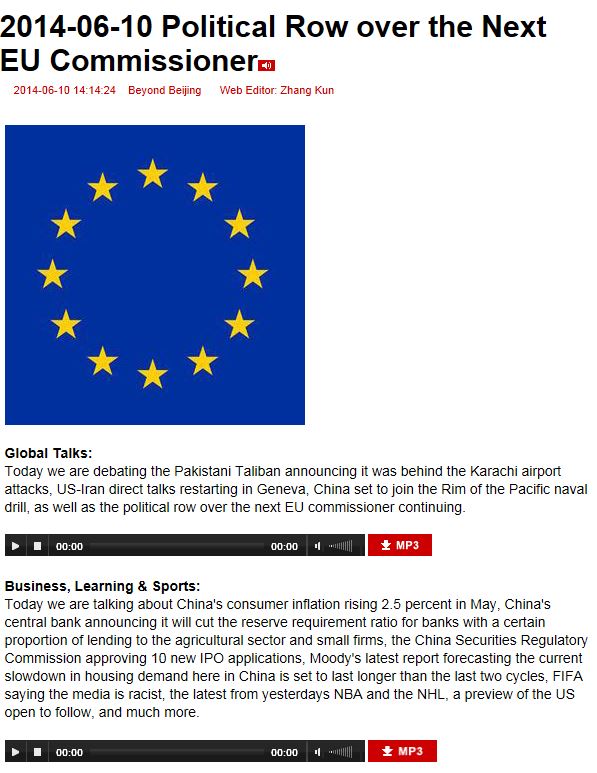 With 7.27 million fresh graduates as well as over 0.30 million oversea returnees, the battle of job-seeking in Chinese talent selection is about to start. What kind of CV can help you stand out? What quality or attitude should graduates have that can attract the attention of employers? And how can students fit well soon in those promising big companies? Lilly Cao, Partner of RMG Selection, is on CRI Education Today to share her opinions and tips with all graduates now! Come and listen to the radio on RMG’s brand-new website!
727万应届毕业生走出校园,还有30万海龟奔涌归来,今年的求职大战即将拉开大幕。广大莘莘学子们该制作什么样的简历,从而能够在求职大军中脱颖而出呢?刚刚入职的同学们,又应该抱着怎样的心态,尽快适应工作呢? RMG Selection的合伙人—Lilly Cao做客中国国际广播电台教育节目,解读毕业生在准备求职简历时应该注意哪些细节。赶快登陆小罗全新官网收听职场专家的建议吧!
With 7.27 million fresh graduates as well as over 0.30 million oversea returnees, the battle of job-seeking in Chinese talent selection is about to start. What kind of CV can help you stand out? What quality or attitude should graduates have that can attract the attention of employers? And how can students fit well soon in those promising big companies? Lilly Cao, Partner of RMG Selection, is on CRI Education Today to share her opinions and tips with all graduates now! Come and listen to the radio on RMG’s brand-new website!
727万应届毕业生走出校园,还有30万海龟奔涌归来,今年的求职大战即将拉开大幕。广大莘莘学子们该制作什么样的简历,从而能够在求职大军中脱颖而出呢?刚刚入职的同学们,又应该抱着怎样的心态,尽快适应工作呢? RMG Selection的合伙人—Lilly Cao做客中国国际广播电台教育节目,解读毕业生在准备求职简历时应该注意哪些细节。赶快登陆小罗全新官网收听职场专家的建议吧!
Tag Archives: Asia Employment Agency
Education Today – RMG Partner on CRI Live
- Thursday, 12 June 2014 09:19
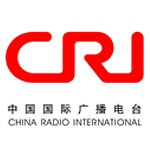
 With 7.27 million fresh graduates as well as over 0.30 million oversea returnees, the battle of job-seeking in Chinese talent selection is about to start. What kind of CV can help you stand out? What quality or attitude should graduates have that can attract the attention of employers? And how can students fit well soon in those promising big companies? Lilly Cao, Partner of RMG Selection, is on CRI Education Today to share her opinions and tips with all graduates now! Come and listen to the radio on RMG’s brand-new website!
727万应届毕业生走出校园,还有30万海龟奔涌归来,今年的求职大战即将拉开大幕。广大莘莘学子们该制作什么样的简历,从而能够在求职大军中脱颖而出呢?刚刚入职的同学们,又应该抱着怎样的心态,尽快适应工作呢? RMG Selection的合伙人—Lilly Cao做客中国国际广播电台教育节目,解读毕业生在准备求职简历时应该注意哪些细节。赶快登陆小罗全新官网收听职场专家的建议吧!
With 7.27 million fresh graduates as well as over 0.30 million oversea returnees, the battle of job-seeking in Chinese talent selection is about to start. What kind of CV can help you stand out? What quality or attitude should graduates have that can attract the attention of employers? And how can students fit well soon in those promising big companies? Lilly Cao, Partner of RMG Selection, is on CRI Education Today to share her opinions and tips with all graduates now! Come and listen to the radio on RMG’s brand-new website!
727万应届毕业生走出校园,还有30万海龟奔涌归来,今年的求职大战即将拉开大幕。广大莘莘学子们该制作什么样的简历,从而能够在求职大军中脱颖而出呢?刚刚入职的同学们,又应该抱着怎样的心态,尽快适应工作呢? RMG Selection的合伙人—Lilly Cao做客中国国际广播电台教育节目,解读毕业生在准备求职简历时应该注意哪些细节。赶快登陆小罗全新官网收听职场专家的建议吧!
After the Interview – China Today
- Wednesday, 04 June 2014 10:07

 SO, the big day has arrived, you had the interview, what’s next? Probably your first instinct is either Starbucks, Erdinger or back to the hotel for an inroom burger. But don’t slack off just yet – what you do next can have a great influence on the outcome of the process, so stay focused for a few more hours.
SO, the big day has arrived, you had the interview, what’s next? Probably your first instinct is either Starbucks, Erdinger or back to the hotel for an inroom burger. But don’t slack off just yet – what you do next can have a great influence on the outcome of the process, so stay focused for a few more hours.Write a Journal Entry Your first step after the interview should be to write a journal entry of the event. By journal entry, I mean write down what you discussed, who you met, what you asked, and anything else that seems relevant. I personally like to keep a journal and photograph notes with my phone. You can do it however you want, but do it! This will give you tremendous advantages. First, you will have better recall (and understanding) of the job for which you are applying. Second, it will make you seem like a knowledgeable, adroit professional, especially if your understanding is reviewed at later interviews (always my second question – in case you’re interested in a career in recruitment). And finally, your journal will put you in a better position to ask your potential employer (and yourself) questions about the role, which will help you make an informed decision. Say Thank You In my experience nothing is more disappointing than people who don’t say thank you. It’s annoying to give your time and effort without recognition or thanks. If you give someone a pay-rise and they don’t thank you it takes the “edge” off the moment (RMG staff please take note). So, when you’ve left the interview and let an hour or so pass, take 20 minutes to draft a thank-you email to the person or people you’ve met. Here’s why: 1. They will immediately remember you. Most people do not follow up, and are quickly forgotten. Ask any business person what they want from their staff, their suppliers, or their spouses: it’s for people to follow-up and do what they say they’ll do. Because most people do not send interview thank-you notes, you will immediately be remembered for doing so. 2. The time to do this is the same day. If you leave it until the next day you’ll be forgotten. Following up the same day reinforces a person’s memory of you. 3. Be sincere. Phrase your follow-up honestly and with integrity. There’s nothing more pretentious and underwhelming than a feast of superlatives if you don’t actually mean them. 4. Be personal as well as to the point. Explain that “I really enjoyed meeting you” (if you did), and then go on to explain what you specifically enjoyed. This will help to build rapport with the interviewer. To quote Simon Cowell’s Dad: “Everyone in the world has a post-it note on their forehead which says ‘I want to feel important’.” Spending time to follow up shows respect, which is especially important in China. 5. Be clear that you would like to go to the next stage in the process (if you do). Companies appreciate confidence and dislike hesitation. There is nothing wrong with being assertive and ending your message with “I really look forward to the next stage in this process” or “I would be really great to meet you again.” Call Your Recruiter Despite the popularity of online job boards and social media sites, in China’s fastpaced employment market the vast majority of professional positions are filled by recruitment firms. The job of a (good) recruiter is to help you understand and manage yourself through the hiring process. Good recruiters work either exclusively for a company or are even pre-paid in advance, and do not have to worry about which candidate takes the job. Likewise good recruiters realize that you gain far more in the long term if you act with integrity and professionalism. Therefore: 1. Treat your recruiter with respect. There’s a reason that qualified attorneys, accountants, marketers and other executives change careers to become recruitment consultants, and it’s not because they’re stupid! So realize that the more you contribute to the recruiter/candidate relationship, the more you will benefit. 2. Trust but test. It’s important to be confident in the knowledge and competence of your recruitment consultant. Ask them challenging questions; probe what they say; test their market knowledge and experience. If you’re confident in their ability, you will relax and be open with the recruiter. 3. Watch out for red flags. Recruiters who tell you how great you are should not be trusted. Recruiters who don’t return your calls clearly aren’t that interested in you. Recruiters who tolerate you not returning their calls are desperate. Don’t work with them. 4. Make sure you call immediately after the interview to debrief. I can’t stress this enough, it must be immediately after all meetings. Their job is to ensure that the interview has gone smoothly, and to guide you when it has not. Therefore they need to have a snapshot of your state right after the interview. And finally, don’t make the mistake of putting all of your eggs in one basket. If you want to move to Shanghai or Beijing, then be focused and make sure you explore the market fully. You won’t know if an opportunity is good until you’ve compared it with another. And one final tip – if someone asks why you are interested in the job, “because I’ve been headhunted” is probably the worst answer you could give, yet I hear it surprisingly often. E-mail me privately if you really need an explanation. Good luck. The author is the founder of RMG Selection and can be contacted via robert.parkinsonATrmgselection.com. Read the article on China Today: http://www.chinatoday.com.cn/english/life/2014-06/04/content_622550.htm
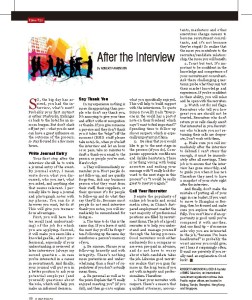
The job market is tough for oversea returnees – Robert on CRI Today
- Friday, 11 April 2014 06:23

China is viewed as one of the most promising emerging market around the globe, attracting a lot of Returnee to work here. Partly because of this, the talent market in China has become a heated topic. Robert Parkinson, CEO of RMG Selection, gave his opinions on the situation that these returnees have to face in CRI. With his human resource experiences of more than 10 years, he also gave his suggestions to this group of people.
随着近些年来国外留学的流行,海归就业已经是一个屡见不鲜且备受关注的话题。但是海归的就业目前仍然面临着很多的问题。罗迈国际的CEO Robert Parkinson 做客CRI,就海归工作市场的问题发表了他的看法。同时针对目前的中国人才市场,他也提出了自己的几点建议。
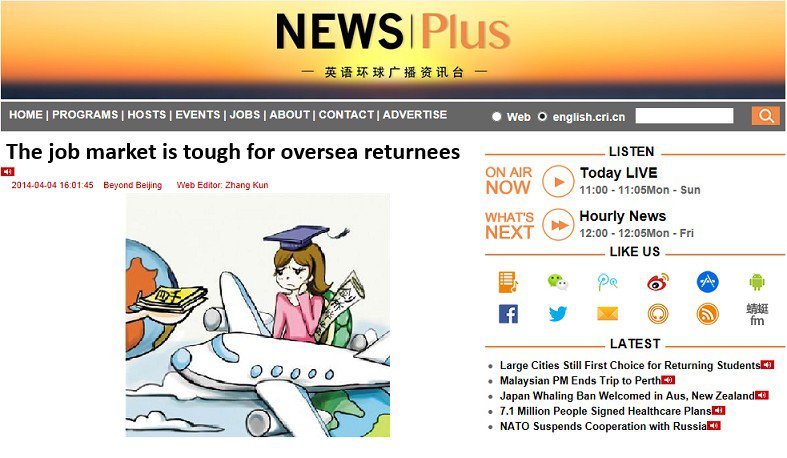 Listen to the original radio here: http://english.cri.cn/7146/2014/04/04/2203s820547.htm
Listen to the original radio here: http://english.cri.cn/7146/2014/04/04/2203s820547.htm
RMG Wechat
- Friday, 21 February 2014 06:34

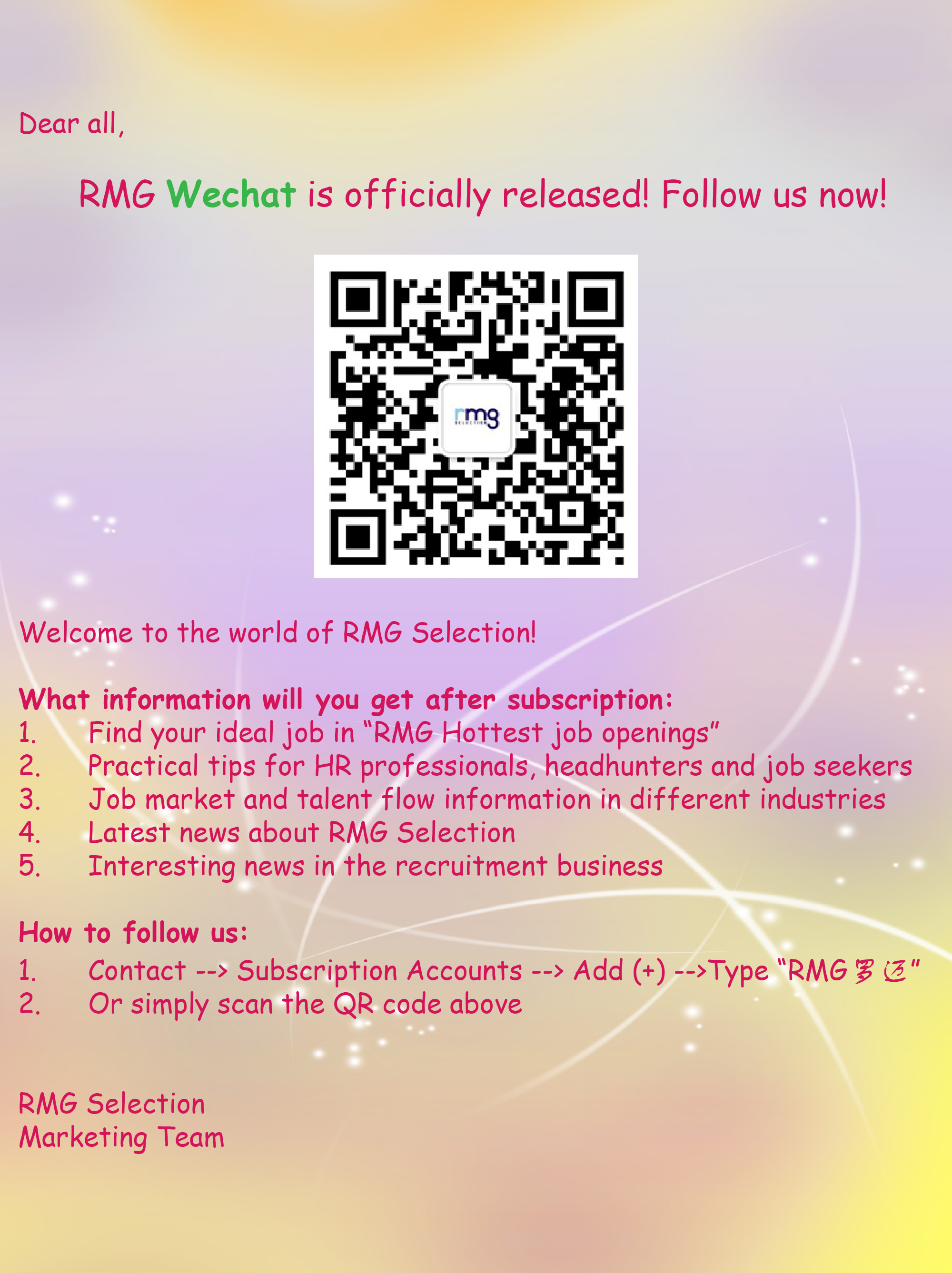
Hardest job hunting season for college graduates-CRI
- Monday, 17 June 2013 07:38

This year, nearly 6.99 million students will graduate from college, an increase of 190,000 compared with 2012. This number is the highest since the People’s Republic of China was founded in 1949.One of the most important indexes of employment, the job contract signing rate, is on a downward slope compared with last year, indicating 2013 will be a tough year for graduates.Watch the video about the interview with Robert Parkinson, founder of RMG Selection, sharing his views about this job huntting year for college students
与2012年相比,今年的毕业生总数(699万)又增长了19万。这是自1949年建国以来毕业生数量最多的一年。作为最重要的就业指标之一,今年的签约率呈现出急剧下降的趋势,这意味着2013年将成为毕业生就业最艰难的一年。你对于中国毕业生艰难的就业形势有何看法呢?即刻点击链接,观看罗迈国际CEO Robert Parkinson在中国国际广播电台节目中的独家看法吧:
 Watch the video on: http://v.youku.com/v_show/id_XNTY3NTU0NTQ0.html
Or listen to the interview on: http://english.cri.cn/8706/2013/05/27/2861s767175.htm#sthash.EIQ37j4G.dpuf
Watch the video on: http://v.youku.com/v_show/id_XNTY3NTU0NTQ0.html
Or listen to the interview on: http://english.cri.cn/8706/2013/05/27/2861s767175.htm#sthash.EIQ37j4G.dpuf
 Watch the video on: http://v.youku.com/v_show/id_XNTY3NTU0NTQ0.html
Or listen to the interview on: http://english.cri.cn/8706/2013/05/27/2861s767175.htm#sthash.EIQ37j4G.dpuf
Watch the video on: http://v.youku.com/v_show/id_XNTY3NTU0NTQ0.html
Or listen to the interview on: http://english.cri.cn/8706/2013/05/27/2861s767175.htm#sthash.EIQ37j4G.dpuf